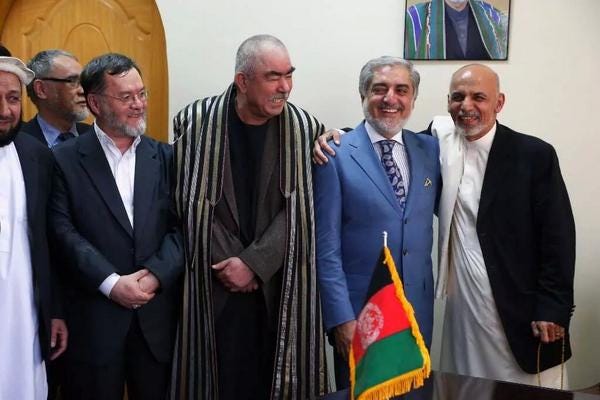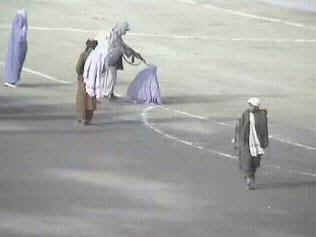On 27 September, 2015, on the first anniversary of the National Unity Government, the Taliban took over the city center of Kunduz, Afghanistan. Kunduz has since been reclaimed by Afghan Government forces, proving the Taliban’s inability from conducting a proper static defense necessary for holding a large amount of territory. The battle of Kunduz is yet another sign that there can be no reaching peace with the Taliban. The notion that the Taliban and the current Afghan government can coexist peacefully is a myth. Furthermore, in the aftermath of the Taliban’s recent attack on Kunduz, their violence has been well documented by Amnesty International.
Earlier this year a Chinese and Pakistani initiated attempt at détente with the Taliban unraveled quickly in the aftermath of the news of Mullah Omar’s death. Let us not forget that the Taliban adhere to a barbaric code of a religion they claim is Islam. Their convoluted interpretation of Islam makes the Saudi based Wahhabis look like the men of the European Enlightenment. Establishing peace with the Taliban is both morally objectionable and illogical because it will be tantamount to legitimizing a proxy force subservient to Pakistan’s interests. It will continue to impose barbarity on the people of Afghanistan while causing regional instability, and promoting international terrorism — as was seen in the 1990s.
Pakistan’s Irregular Warfare Campaign
In 2013, with the backing and urging of Pakistan’s then Army Chief Parvez Kayani, the U.S. agreed to enter into peace talks with the Taliban.[1] The arrangement orchestrated by Pakistan made the U.S. appear weak and flailing; resulting in a strategic victory for the Taliban. One of the principle reasons why peace with the Taliban will not be achieved is because they remain a proxy force used by Pakistan to weaken the Afghan state; thereby ensuring that Islamabad’s equities are intact. Pakistan has waged an unconventional war against the Afghan State since the early 1960s. U.S. Army Special Forces Officer Douglas Livermore’s essay, “Pakistani Unconventional Warfare Against Afghanistan,” outlines this case at great length.[2]
Ahmad Shah Massoud (Left) and Gulbudun Hektmatyar (Right), attempted to overthrow the Afghan government in the early 1970's, and replace it with a Pakistani backed Islamist regime.
Pakistan has relied on a long list of proxy forces and unabashed interference in Afghan affairs. Starting from Ahmad Shah Massoud and Gulbudin Hektmayar’s failed coup attempts in the early 1970s against the presidency of Sardar Muhammad Doud Khan[3], to the funneling of weapons to the most extreme and radical mujahedeen groups such as Abdul Rasoul Sayaf, and yet again Gulbudin Hekymatyar in the 1980s, to training and equipping the Taliban in the 1990s[4]. Perhaps the most disturbing act by Pakistan was “Operation Evil Airlift,” which allowed President Musharraf to pull out members of the ISI, the Pakistani military, and foreign fighters out of Kunduz, Afghanistan in November of 2001.[5] This was happening, all the while U.S. Special Forces and the Northern Alliance were attempting to clear the city of terrorists. You can read more about that here and here.
Pakistani fears of losing “Pashtunistan” has shaped its Afghan-policy.
Why Does Pakistan Support the Taliban?
Pakistan has two reasons for its intransigence. The first reason is driven by the fear of partition and separation. The Durand Line (depicted in red) splits the Pashtun ethnic groups into two states, Pakistan and Afghanistan, this fear of losing territory has caused Pakistan to employ shrewd statecraft and irregular warfare against Afghanistan.
The Pashtuns are the dominant ethnic group in Afghanistan, and except for a short period in the early 1920s and 1990s, Pashtuns have always held the reigns of the Afghan government. Pakistan fears that a strong Afghan state with a nationalistic agenda would attempt to reclaim Pashtun territories (about 1/3 of Pakistan). In essence, reclaim what is known as “Pashtunistan.” From Pakistan’s lens, this loss of Pashtunistan would likely encourage the Baloch, Sinhdis, and other ethnic groups to obtain their own independence. This would leave Punjab to Pakistan, in essence Pakistan would only be “Punjabistan”. Therefore, keeping a weak an inept Afghanistan in line with Islamabad’s is one of Pakistan’s primary foreign policy pillars. The only Afghan government that has not challenged Pakistan over the Durand Line was the Taliban. Thus, for Pakistan the Taliban remains just the type of government and puppet state that Pakistan wants to see on her northern and western flanks.
The second reason for Pakistan to back the Taliban and press for peace talks is its misguided notion of “strategic depth.” Pakistan believes that a friendly and subservient government in Kabul will act as strategic depth in the event that Pakistan becomes involved in a conventional war with India.[6] Pakistan’s narrow body of land would require their army to fall back into Afghan territory in order to properly defend itself against a conventional Indian force, which is superior to her own. Kabul’s historically friendly relationship with New Delhi has also added to Pakistani paranoia. Since its birth, Pakistan’s foreign policy has been formulated on its founder, Mohammad Ali Jinnah’s famous dictum that Pakistan is “moth-eaten and truncated.”[7] This paranoid assessment of its standing among Pakistan’s neighbors, has colored most of its foreign policy decisions. Pakistan lives in fear of another Indian-instigated vivisection; just like the secession of Bangladesh in 1971. Only this time it might be with assistance from a strong willed government in Kabul. As long as Pakistan does not let go of its paranoia, it will do its utmost to place the Taliban or a Taliban type government in Kabul.
So, while Pakistan has pushed for peace talks with the Taliban, peace with them only benefits the state of Pakistan. Pakistan’s view of peace with the Taliban entails the placement of actual, dyed-in-the-wool Taliban ideologues in the ranks of the Afghan civilian and military establishments. This would result in infiltration of Afghan military and civilian cadres, by pro-Wahhabi partisans from Hekmatyar’s Hezbi-Islami and the Haqqani network.
What Needs to Happen
 Establishing sustainable peace in Afghanistan, and the region at large, requires the total and unequivocal neutralization of the Taliban as a viable fighting force. This is because the Taliban and peace are antithetical to each other. Defeat of the Taliban requires a broad based international effort to dissuade the Pakistani government from supporting Taliban action in Afghanistan. The U.S. policy in particular should be geared at rendering Islamabad either incapable of aiding the Taliban or unwilling to do so. Declaring the Taliban as a foreign terrorist organization is the first step. After all, an insurgent force without protected safe-havens, financial institutions, resources, materiel, logistics capabilities, and a host-state will be unable to survive for long.
Establishing sustainable peace in Afghanistan, and the region at large, requires the total and unequivocal neutralization of the Taliban as a viable fighting force. This is because the Taliban and peace are antithetical to each other. Defeat of the Taliban requires a broad based international effort to dissuade the Pakistani government from supporting Taliban action in Afghanistan. The U.S. policy in particular should be geared at rendering Islamabad either incapable of aiding the Taliban or unwilling to do so. Declaring the Taliban as a foreign terrorist organization is the first step. After all, an insurgent force without protected safe-havens, financial institutions, resources, materiel, logistics capabilities, and a host-state will be unable to survive for long.
The Afghan government needs to self-reform, and take the business of governance seriously. Time is not on their side.
The Afghan Government
Lastly, the Afghan government needs to break away from years of ethnic rivalry, corruption, and nepotism. It must be able to garner the trust of its own population as a respected and legitimate government — failure to do so, only emboldens the insurgency. Afghanistan needs a unity government with a focus on creating opportunities for a nation state, rather than filling their own coffers for personal gain. If it continues on its current path of incompetence and perversion, then there will more cities like Kunduz that will fall. Afghanistan’s renegade warlords, generals, and security officials need to pay attention.
Lemar Alexander Farhad is an active duty Army Officer with extensive experience in international affairs and military operations. He has multiple deployments to Iraq, Afghanistan, and Kosovo. Currently, Lemar is a graduate student at the Naval Postgraduate School in Monterey, California. The opinions and positions stated here are his alone and do not represent the views or policies of the Government of the United States or any of its agencies.



No comments:
Post a Comment